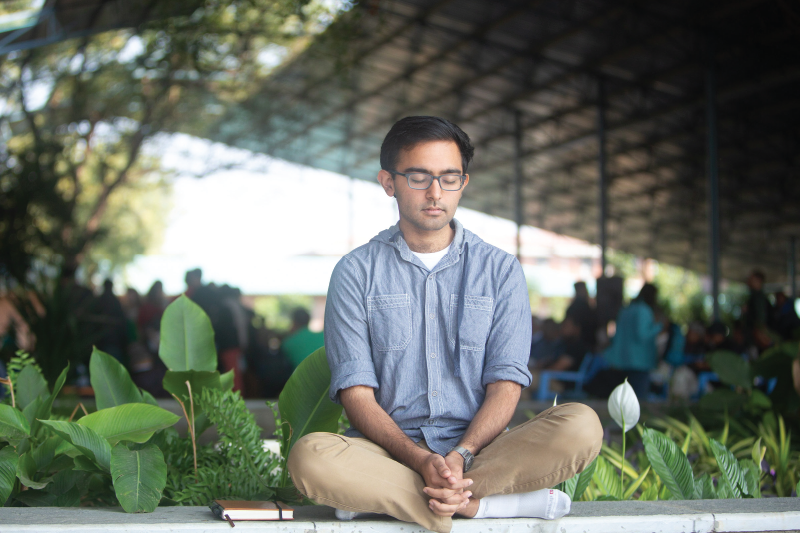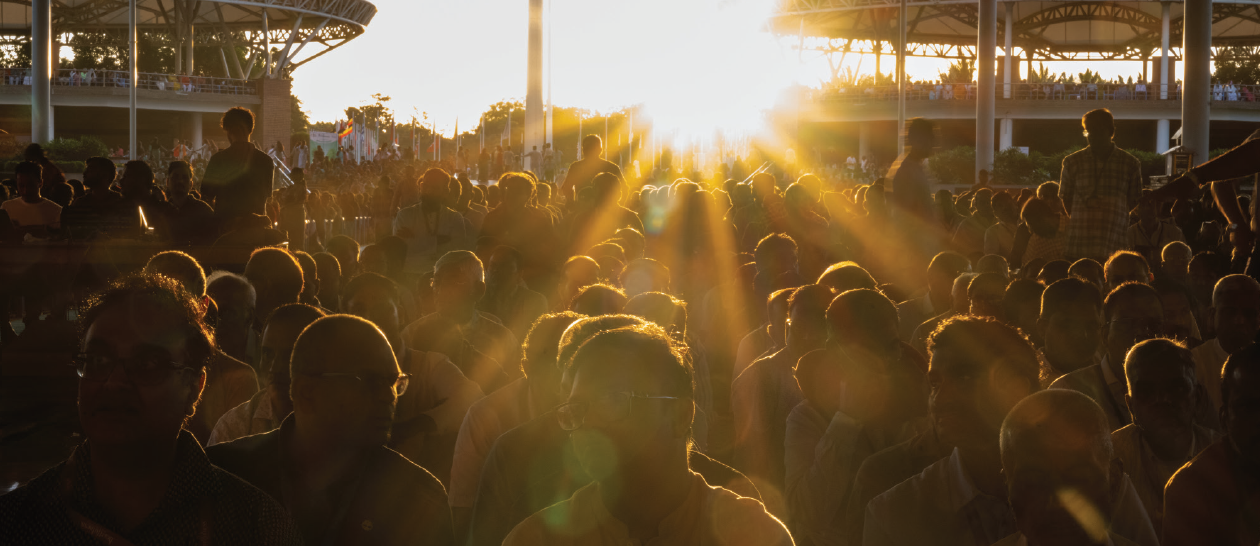SURAJ SEHGAL speaks with MAMATA SUBRAMANYAM about coming together and creating community with change and vision.
Q: You're a Heartfulness trainer. Can you explain what that means?
SS: A byproduct of what we do is serving humanity and serving each other. One of the primary roles and responsibilities of a trainer, however, is to represent the living guide and to understand that he has a purpose in the work that he’s doing, and work on his behalf. There's often more to the work than we understand at our mundane and human level.
Q: Why is having a living trainer essential for meditation practice, whether for new or seasoned practitioners?
SS: I think mastery of any field always benefits from a teacher, whether it's a karate master or an art teacher; we learn by mimicking and by understanding those who have excelled in the field before us. As humans, we have a unique ability to read books and understand things from the past and then build on them. The entire scientific body is all about constantly iterating and reworking and retesting and discovering new things, building on what we've already learned so far.
To me, the spiritual field is total. It dictates and influences every aspect of your being and life, making it even more important to have someone who can guide you and provide direction when needed. There's so much that I've learned. I think it's that quote of “Inspiration is caught, not taught,” right? And while the guides of Heartfulness have developed and codified a set of practices that, if followed, will deepen a person, spiritually speaking, there's still so much more that is learned by just observing the way that they talk, conduct themselves, the way they respond to a question, the way that they walk.
So much of human life is about how we respond, where we place our attention, and how we respond to what’s around us. And I think in observing Daaji and the guides before him as well, sometimes consciously, I've picked up things about the way they place a glass on a table, or the way they notice something that seems like they had ignored. And they continued to think about the feelings of someone they had spoken to just a few hours before. Some of that I can consciously imbibe, but a lot of it is unconscious, the sitting, the way that we, on a mass scale, like during a large meditation gathering, unconsciously imbibe from that teaching done in silence together.
Q: As you say this, I'm just reflecting on the trainers that I've watched. I see the uniqueness of how each trainer conducts themselves, whether it is their poise, the way they pause, or their awareness of others and their needs. I also know that, like any of us, they are human and consistently work on growing to be the type of person they want to be, based on the principles of Heartfulness.
In the moments where you, as a trainer, feel like you struggle with that point of growth, how do you handle it? And what should we even be aspiring toward?
SS: Most recently, I became a parent. It has had me reflecting a lot on what the role of a parent is in a child's life. In many ways, we're all emotional machines, right? We come into this world with a capacity for thinking, attention, and skill development. But a lot of that is dependent on where we place our attention. Much of where we direct our attention is dependent on the emotions that guide us.
Why does a kid focus on one thing or the other? Somewhere, it is the expectations and the emotional reward or punishment, however slight, given by the structure in which they grow up. The ones around us shape us. It's a simple fact. Whether it's a schoolteacher with expectations or a school system that gets you to focus a lot on grades, you place a lot of emotions on these situations, and your achievements are motivated by that.
I’ve had friends who were really into physical fitness, mainly because their family history in the military emphasized the importance of physical fitness and prowess. Even though they ended up pursuing their PhD, being fit was just a part of their being, right? The emotions from early on and throughout our lives make us emotional machines.
The reason I bring that up is that we're each so different, and we all have our desires, thoughts, and aspirations. Thinking about the role of a parent, I cannot stop my kid from falling. I cannot protect them from the fact that they have fallen; life happens. Their heart will be broken. They will aspire for something and fail. I cannot save them from that. But often the role of the parent is to guide and direct a kid's attention, to say, “Oh, you failed. But look at what you can do next. You can also get back up.” Your role is almost to serve as an emotional guide on how to handle something, because we are emotional machines.
Every time we face something for the first time, it is extremely emotional, right? When I was a graduate student instructor at UC Berkeley, I would sit one-on-one with so many students who were receiving a C for the first time in their lives. As someone who generally tries to be empathetic and meet people where they’re at, I would engage with these students and understand that “failing” feels like a lot. This feels like the end of the world for you. And the only thing I can tell you, as someone who’s lived ten more years, is that you will probably receive a few more Cs throughout college. This is your first semester, your first year, and it’s okay; you will get through it. This isn’t easy, but it’s something that you can learn from. It gave me a lot of insight into the role of a parent, which is that you've just been through a lot of things before. That's why grandparents can be so comforting; they've experienced a wide range of emotions and ups and downs.
The role of a trainer is very similar; when I reflect on the way I’ve grown in the last ten years, it’s all been inward. Much of it revolves around emotions and conditions, encompassing the mastery of intense emotions. How do I deal with a day when I suddenly feel an intense craving to become one with the Divine, and it’s unbearable? Where do I go? Does anyone even understand what that feeling is? That’s where having a trainer is important; it’s not just somebody who has mastered it and knows exactly what to do next. It's somebody who’s maybe experienced that condition before you and can tell you, “Hey, you're not alone, and I see that you've fallen, I've also fallen.” It reminds us that having experienced a certain level of emotions and mastery in the past doesn’t necessarily mean we’re good. It only serves as a foundation for us to continue learning, trying, and remembering that, no matter what difficulties we face, a trainer is also there to give us support.

Q: Heartfulness is now millions strong, with over 16,000 trainers supporting the organization in 160 countries. We're growing rapidly, and it can be challenging to stay connected to one another. There are all these links, including trainers, that keep us all together. I often reflect on my responsibility as a trainer to build community wherever I am around meditation, not because I think my way is the best, but because I know that I simply want to connect with people, heart to heart. I imagine that it is a similar feeling for you.
SS: One of the keystones of a good spiritual practice is the community. There is so much that we can learn from one another; in supporting each other, we also grow. I grew up in a world where both my parents were trainers, surrounded by weekly group meditations and people visiting our home for individual sessions. That translated to what I thought of as community; it felt super normal to host a housewarming, a Diwali party, or a holiday get-together and simply start with a meditation, followed by food. You mark it with a sacred silence in communion with the people around you. It is in silence that we share, not only our love with the Divine, but we share that divine love.
One of the keystones of a good spiritual practice is the community.
There is so much that we can learn from one another;
in supporting each other, we also grow.
What made our marriage ceremony so special was that it was conducted by my spiritual guide, in silence, and surrounded by some of our closest family members. In those forty minutes, I felt like I shared and received so much more with these loved ones than you could have ever said or given in an envelope. To me, that's deep, unshakable, and it relies purely on your openness, your heart, and your intention.
When it comes to building a community, what’s been truly transformative is coming from a place of: “What is the world that I want to live in? What do I want the world to look and feel like? What are the best parts of humanity that I've experienced, whether in the Heartfulness community, another meditation community, or just in general?” And then to be able to say, “Okay, based on my capacity and means, what can I emulate right now?” But even more than that, “What can I set an intention for, for what I want this area around me to look like?”
I think it will soon extend beyond just whether people meditate or not, but to start with the folks who share this sacred silence with you. It goes much further, at least that’s what I felt. We begin with those around us and those we want to look out for. We do whatever is within our means and set an intention for what we aspire to. It will happen. We have the power of meditation and the support of our guide behind us.

Suraj Sehgal
Suraj is currently an MBA student at UC Berkeley Haas. He has been a consultant for large government clients and studied engineering at Georgia Tech. Suraj is a storyteller at heart, and is a blogger and public speaker. His aspiration is... Read More

